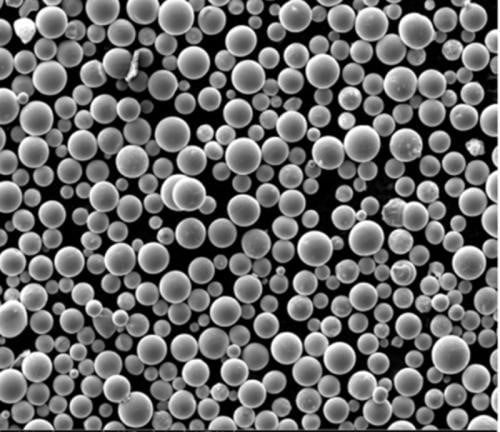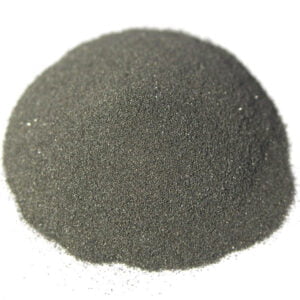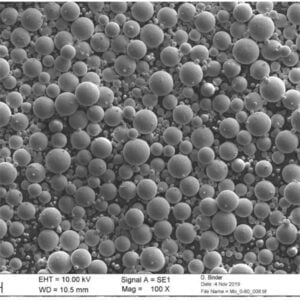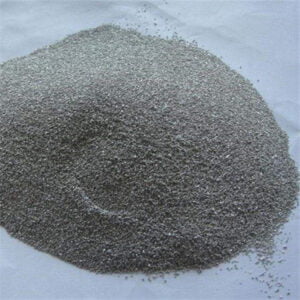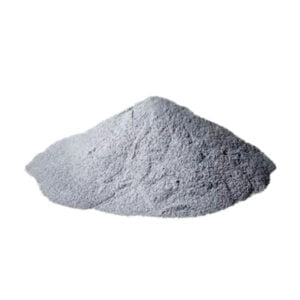FeCoNiCr powder
FeCoNiCr powder refers to an alloy composed of iron (Fe), cobalt (Co), nickel (Ni), and chromium (Cr). The combination of these elements brings forth a host of desirable characteristics, making it an ideal material for additive manufacturing processes. The powder is finely granulated and specifically formulated to enable efficient utilization in 3D printers, where it can be selectively deposited layer by layer to create intricate and complex structures.
Low MOQ
Provide low minimum order quantity to meet different needs.
OEM & ODM
Provide customized products and design services to meet unique customer needs.
Adequate Stock
Ensure fast order processing and provide reliable and efficient service.
Customer Satisfaction
Provide high quality products with customer satisfaction at the core.
share this product
Table of Contents
Overview of FeCoNiCr Powder
FeCoNiCr belongs to a class of high performance alloys that exhibit good mechanical properties, microstructural stability and environmental resistance at elevated temperatures exceeding 750°C. Iron and cobalt provide strength. Nickel enhances ductility and toughness. Chromium provides oxidation and corrosion resistance.
Key characteristics of FeCoNiCr powder include:
- Excellent high temperature strength and creep resistance
- Good fatigue strength and toughness
- High hardness, wear resistance, and abrasion resistance
- Outstanding corrosion and oxidation resistance
- Available in various particle size distributions and morphologies
FeCoNiCr powder is designed for protective coatings, thermal spray, welding, additive manufacturing and other high temperature applications requiring strength, hardness and environmental resistance.
Composition of FeCoNiCr Powder
FeCoNiCr powder has the following nominal composition:
| Element | Composition |
|---|---|
| Iron (Fe) | Balance |
| Cobalt (Co) | 35-50% |
| Nickel (Ni) | 10-30% |
| Chromium (Cr) | 8-12% |
| Carbon (C) | <0.5% |
| Silicon (Si) | <1.5% |
| Manganese (Mn) | <1% |
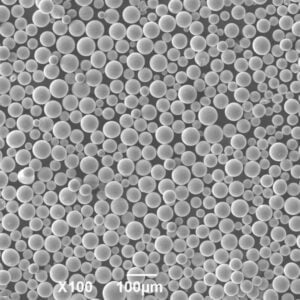
The levels of cobalt, nickel and chromium can be adjusted based on requirements to optimize mechanical properties and environmental resistance. Impurities are minimized.
Properties of FeCoNiCr Powder
Key properties of FeCoNiCr powder include:
| Property | Value |
|---|---|
| Density | 7.5-8.2 g/cm3 |
| Melting Point | 1300-1400°C |
| Thermal Conductivity | 10-30 W/mK |
| Electrical Resistivity | 65-85 μΩ.cm |
| Young’s Modulus | 190-220 GPa |
| Poisson’s Ratio | 0.28-0.32 |
| Tensile Strength | 600-1100 MPa |
| Yield Strength | 450-800 MPa |
| Elongation | 15-30% |
| Hardness | 30-50 HRC |
The properties like high temperature strength, hardness, wear resistance, and corrosion resistance make it suitable for the most demanding applications.
Production Method for FeCoNiCr Powder
FeCoNiCr powder can be produced via:
- Gas Atomization – High pressure inert gas used to atomize molten alloy resulting in fine spherical powder ideal for AM.
- Water Atomization – High velocity water jet breaks up molten metal into fine irregular powder particles. Economical but higher oxygen pickup.
- Mechanical Alloying – Ball milling of blended elemental powders followed by sintering and secondary atomization.
Gas atomization provides the best control over particle size, shape, purity and microstructure.
Applications of FeCoNiCr Powder
Typical applications of FeCoNiCr powder include:
- Thermal Spray Coatings – HVOF or plasma spraying to deposit thick wear and corrosion resistant coatings on tools, molds, valves, bearings etc.
- Additive Manufacturing – Selective laser melting to produce complex components for high temperature environments.
- Welding Filler – Provides excellent elevated temperature strength, hardness and corrosion resistance in the weld zone.
- Brazing Filler – Used to join components operating at very high temperatures requiring oxidation resistance.
- Glass Processing – Powder metallurgy conveyor rolls with high temperature strength used in glass melting furnaces.
Specifications of FeCoNiCr Powder
FeCoNiCr powder is available under various size ranges, shapes, grades and purity levels:
- Particle Size: From 15-45 μm for AM methods, up to 150 μm for thermal spray processes.
- Morphology: Spherical, irregular and blended shapes. Spherical powder provides optimal flow and packing.
- Purity: From commercial purity to ultra high purity grades based on stringent chemical analysis and application requirements.
- Surface Area: Low surface area preferred to minimize oxidation during handling and storage.
- Grades: Customized composition and powder metallurgy tailored for intended application and processing method.
Global Suppliers of FeCoNiCr Powder
Some of the major global suppliers of FeCoNiCr powder include:
- Sandvik Osprey (UK)
- Erasteel (France)
- Tekna (Canada)
- Edgetech Industries (USA)
- Hoganas (Sweden)
- CNPC Powder (China)
These companies produce various grades of FeCoNiCr powder using gas atomization, water atomization and mechanical alloying processes tailored for specific applications.
Pricing of FeCoNiCr Powder
FeCoNiCr powder prices depend on factors like:
- Composition, purity levels
- Powder size and morphology
- Production method
- Order volume
- Manufacturer and location
| Grade | Price Range |
|---|---|
| Commercial | $60-120 per kg |
| High purity | $120-250 per kg |
| Ultrafine | $250-450 per kg |
| Special grade | $450-850 per kg |
Gas atomized, controlled particle size, high purity powders command much higher pricing compared to commercial grades.
Storage and Handling of FeCoNiCr Powder
Proper storage and handling procedures for FeCoNiCr powder include:
- Store in sealed containers under inert gas to prevent oxidation
- Avoid accumulation of fine powder to control explosion risks
- Use appropriate PPE, ventilation, safety practices when handling
- Prevent contact between powder and incompatible materials
- Follow applicable safety guidelines from supplier SDS
Caution and protective measures are essential when handling this reactive alloy powder.
Inspection and Testing of FeCoNiCr Powder
Key quality control tests performed on FeCoNiCr powder:
- Chemical analysis using OES or XRF to ensure composition is within specified limits
- Particle size distribution using laser diffraction as per ASTM B822 standard
- Morphology analysis through SEM imaging
- Powder flow rate measurement as per ASTM B213 standard
- Density determination by helium pycnometry
- Impurity testing using ICP-MS
- Microstructural characterization by XRD phase analysis
Thorough testing verifies powder quality and consistency for the intended high temperature application.
Comparison Between FeCoNiCr and 316L Stainless Steel Powders
FeCoNiCr and 316L stainless steel powders compared:
| Parameter | FeCoNiCr | 316L SS |
|---|---|---|
| Composition | Quaternary high-temp alloy | Fe-Cr-Ni stainless alloy |
| Cost | Higher | Lower |
| High temperature strength | Much better | Moderate |
| Corrosion resistance | Comparable | Better |
| Thermal conductivity | Higher | Lower |
| Workability | Moderate | Excellent |
| Applications | Thermal spray, AM | Automotive, construction |
FeCoNiCr offers far superior high temperature strength whereas 316L provides better fabrication characteristics and corrosion resistance at lower cost.
FeCoNiCr Powder FAQs
Q: How is FeCoNiCr powder produced?
A: FeCoNiCr powder is commercially produced using gas atomization, water atomization and mechanical alloying followed by sintering. Gas atomization offers the best powder characteristics.
Q: What are the main applications for FeCoNiCr powder?
A: Main applications include thermal spray coatings, additive manufacturing, brazing filler material, powder metallurgy hot work tooling, glass processing equipment where high temperature strength and resistance is required.
Q: What is the recommended particle size for thermal spraying?
A: For most thermal spray processes, a particle size range of 45-150 microns is preferred for FeCoNiCr powder to maximize deposition efficiency and coating properties.
Q: Does FeCoNiCr powder require any special handling precautions?
A: Yes, proper protective measures are essential when handling this reactive fine alloy powder including inert atmosphere, grounding, ventilation, PPE.
Q: Where can I purchase FeCoNiCr powder suitable for additive manufacturing?
A: For AM applications requiring high temperature strength, fine FeCoNiCr powder can be purchased from leading manufacturers including Sandvik, Erasteel, Tekna, and Edgetech Industries.
Get Latest Price
About Met3DP
Product Category
HOT SALE
CONTACT US
Any questions? Send us message now! We’ll serve your request with a whole team after receiving your message.

Metal Powders for 3D Printing and Additive Manufacturing
COMPANY
PRODUCT
cONTACT INFO
- Qingdao City, Shandong, China
- [email protected]
- [email protected]
- +86 19116340731






